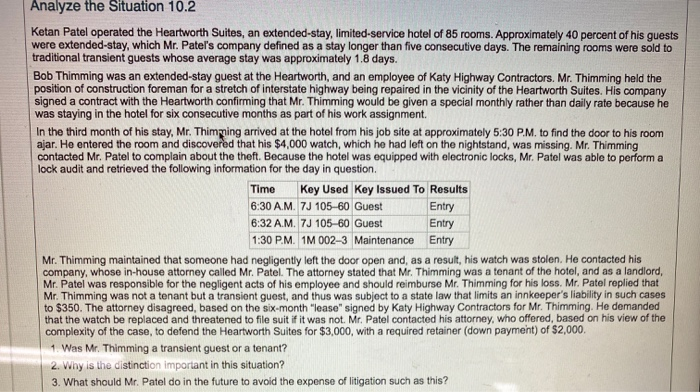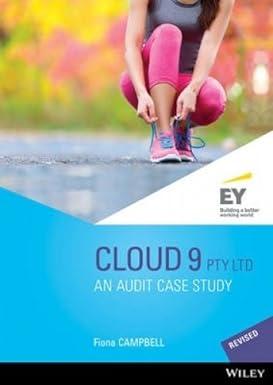Analyze the Situation 10.2 Ketan Patel operated the Heartworth Suites, an extended-stay, limited-service hotel of 85 rooms. Approximately 40 percent of his guests were extended-stay, which Mr. Patel's company defined as a stay longer than five consecutive days. The remaining rooms were sold to traditional transient guests whose average stay was approximately 1.8 days. Bob Thimming was an extended-stay guest at the Heartworth, and an employee of Katy Highway Contractors. Mr. Thimming held the position of construction foreman for a stretch of Interstate highway being repaired in the vicinity of the Heartworth Suites. His company signed a contract with the Heartworth confirming that Mr. Thimming would be given a special monthly rather than daily rate because he was staying in the hotel for six consecutive months as part of his work assignment. In the third month of his stay, Mr. Thimpping arrived at the hotel from his job site at approximately 5:30 P.M. to find the door to his room ajar. He entered the room and discovered that his $4,000 watch, which he had left on the nightstand, was missing. Mr. Thimming contacted Mr. Patel to complain about the theft. Because the hotel was equipped with electronic locks, Mr. Patel was able to perform a lock audit and retrieved the following information for the day in question. Time Key Used Key Issued To Results 6:30 A.M. 7J 105-60 Guest Entry 6:32 A.M. 7J 105 60 Guest Entry 1:30 P.M. 1M 002-3 Maintenance Entry Mr. Thimming maintained that someone had negligently left the door open and, as a result, his watch was stolen. He contacted his company, whose in-house attorney called Mr. Patel. The attorney stated that Mr. Thimming was a tenant of the hotel, and as a landlord, Mr. Patel was responsible for the negligent acts of his employee and should reimburse Mr. Thimming for his loss. Mr. Patel replied that Mr. Thimming was not a tenant but a transient quest, and thus was subject to a state law that limits an innkeeper's liability in such cases to $350. The attorney disagreed, based on the six-month "lease" signed by Katy Highway Contractors for Mr. Thimming. He demanded that the watch be replaced and threatened to file suit if it was not. Mr. Patel contacted his attorney, who offered, based on his view of the complexity of the case, to defend the Heartworth Suites for $3.000, with a required retainer (down payment) of $2,000. 1. Was Mr. Thimming a transient guest or a tenant? 2. Why is the distinction important in this situation? 3. What should Mr. Patel do in the future to avoid the expense of litigation such as this? Analyze the Situation 10.2 Ketan Patel operated the Heartworth Suites, an extended-stay, limited-service hotel of 85 rooms. Approximately 40 percent of his guests were extended-stay, which Mr. Patel's company defined as a stay longer than five consecutive days. The remaining rooms were sold to traditional transient guests whose average stay was approximately 1.8 days. Bob Thimming was an extended-stay guest at the Heartworth, and an employee of Katy Highway Contractors. Mr. Thimming held the position of construction foreman for a stretch of Interstate highway being repaired in the vicinity of the Heartworth Suites. His company signed a contract with the Heartworth confirming that Mr. Thimming would be given a special monthly rather than daily rate because he was staying in the hotel for six consecutive months as part of his work assignment. In the third month of his stay, Mr. Thimpping arrived at the hotel from his job site at approximately 5:30 P.M. to find the door to his room ajar. He entered the room and discovered that his $4,000 watch, which he had left on the nightstand, was missing. Mr. Thimming contacted Mr. Patel to complain about the theft. Because the hotel was equipped with electronic locks, Mr. Patel was able to perform a lock audit and retrieved the following information for the day in question. Time Key Used Key Issued To Results 6:30 A.M. 7J 105-60 Guest Entry 6:32 A.M. 7J 105 60 Guest Entry 1:30 P.M. 1M 002-3 Maintenance Entry Mr. Thimming maintained that someone had negligently left the door open and, as a result, his watch was stolen. He contacted his company, whose in-house attorney called Mr. Patel. The attorney stated that Mr. Thimming was a tenant of the hotel, and as a landlord, Mr. Patel was responsible for the negligent acts of his employee and should reimburse Mr. Thimming for his loss. Mr. Patel replied that Mr. Thimming was not a tenant but a transient quest, and thus was subject to a state law that limits an innkeeper's liability in such cases to $350. The attorney disagreed, based on the six-month "lease" signed by Katy Highway Contractors for Mr. Thimming. He demanded that the watch be replaced and threatened to file suit if it was not. Mr. Patel contacted his attorney, who offered, based on his view of the complexity of the case, to defend the Heartworth Suites for $3.000, with a required retainer (down payment) of $2,000. 1. Was Mr. Thimming a transient guest or a tenant? 2. Why is the distinction important in this situation? 3. What should Mr. Patel do in the future to avoid the expense of litigation such as this







